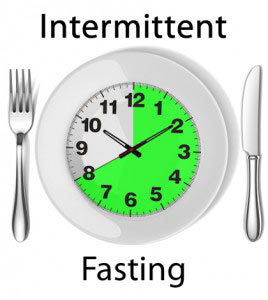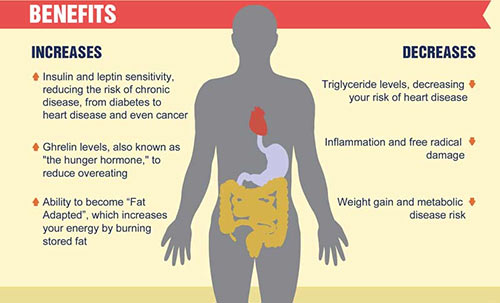 There are many different ways to lose weight. The traditional way is to use a combination of diet and exercise, and a good supplement can be useful for speeding up the fat burning process and improving results.
There are many different ways to lose weight. The traditional way is to use a combination of diet and exercise, and a good supplement can be useful for speeding up the fat burning process and improving results.
However, there are also a lot of fad diets doing the rounds, such as the Grapefruit Diet, the Cabbage Diet and, intermittent fasting.
The latter is becoming increasing popular these days and is somewhat of an umbrella term that is used for any form of diet that involves cycling between periods of eating normally and periods of self-starvation.
Why is Intermittent Fasting Becoming Such a Popular Way to Lose Weight?
Table of Contents
The popularity of intermittent fasting techniques, such as the 5:2 Diet, is on the rise for a number of reason.
For one thing intermittent fasting is less complicated than many other fad diets because there is no need to search out and stick to certain kinds of foods types such as fruit (Grapefruit Diet), vegetables (Cabbage Soup Diet), or protein (Caveman Diet).
The fact that many celebrities, including pop icon Beyonce Knowles, are believed to favour intermittent fasting is also a big selling point.
A Look at Some Intermittent Fasting Techniques
Intermittent fasting always involves periods of eating normally and periods of eating little or no food for extended periods of time (usually 16-48 hours). There are a number of different variations, but here are a few of the most popular ones:
Eat-Stop-Eat-Type Diets
People who practice eat-stop-eat dieting techniques, such as the 5:2 Diet have to severely restrict their calorie intake for 24 hours on a regular basis. In the case of the 5:2 Diet, people have to fast two days per week (not consecutive) but can eat more or less normally for the other five days.
Random Meal Skipping
Random Meal Skipping is less restrictive than other ways of intermittent fasting because it does not involve such long periods of “empty belly” time. It’s just a case of selecting a meal to skip and then doing so once or twice a week.
However, proponents of this system are encouraged to avoid processed foods and stick to more natural alternatives; so there are shades of the Cavemen Diet involved and it is important not to snack in between meals.
Alternate-Day Fasting
There are different ways to practice alternate-day fasting. Some people eat for 12 hours and then fast for 36 hours, but that’s a long time to go without eating normally.
Not surprisingly, many people prefer to eat normally for 24 hours and then fast for 24 hours. There is even a more “user friendly version” that allows to to eat normally for 24 hours and then eat up to 500 calories, spread out over the following 24-hour period.
Does Intermittent Fasting Work?
The simple answer is “yes”. Intermittent fasting works. Scientific research proves this, but results can vary depending on the version used and it also appears to be better suited to some individuals than it is to others.
The reason why people may experience different levels of success could be due to the kind of diet they eat on the days they are allowed normal food. It stands to reason that, even on a fast day, the body can only burn a certain amount of calories. If the diet on non-fast days is overly high in calories the system could fail.

Alleged Intermittent Fasting Benefits
Aficionados of the this form of fasting claim it can provide many benefits.
A few of the benefits associated with intermittent fasting include:
- Decreased likelihood of developing Type 2 Diabetes
- Boosted human growth hormone levels
- Improved healing abilities
- Accelerated metabolism
- Longer life
- Lower blood pressure
- Weight loss
People who practice intermittent fasting are often quick to point out the fact that man’s ancestors, who obtained their food by hunting and gathering, often had to go without food because it wasn’t always available.
It is argued that this is a more natural eating pattern because the human body adapted to such eating restrictions many thousands of years ago. However, experts who have studied the technique agree further study is needed before intermittent fasting can be recommended.
The Negative Aspects
Fasting may have been normal in the days when people ran about with big sticks in their hands hoping to find a baby dinosaur to club to death and take home for lunch, but things are different these days.
The average person is not used to going long periods without food, and starving the body in this way can have negative consequences.
Some of the side effects of intermittent fasting include:
- Dehydration
- Constipation
- Diarrhoea
- Headaches
- Stress/anxiety
- Heartburn
- Reduced athletic performance
- Feelings of lethargy
- Missed periods
- Early menopause
In Summary
Internet fasting is not suitable for everyone and should never be attempted by pregnant women, diabetics, or anyone with a history of eating disorders.
Bearing in mind the extreme nature of this kind of dieting technique, it would be wise for all prospective intermittent fasters to gain their doctors approval before attempting to restrict their calorie intake to such an extent for extended periods of time.
It is also worth noting anyone who has the willpower necessary to fight hunger urges for long enough to maintain such a fast should have no trouble controlling their eating habits sufficiently to lose weight by following a normal calorie controlled diet every day. Going to extremes is unnecessary, could be seen as foolish and, for some people, may even be dangerous.
Which diet and weight loss products are most effective – click here
Leave a Reply